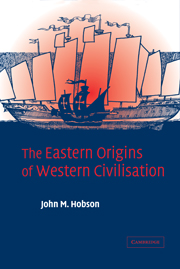Book contents
- Frontmatter
- Contents
- List of tables
- Preface and acknowledgements
- Map: Hobo-Dyer projection of the world
- 1 Countering the Eurocentric myth of the pristine West: discovering the oriental West
- I The East as an early developer: the East discovers and leads the world through oriental globalisation, 500–1800
- II The West was last: oriental globalisation and the invention of Christendom, 500–1498
- III The West as a late developer and the advantages of backwardness: oriental globalisation and the reconstruction of Western Europe as the advanced West, 1492–1850
- 8 The myth of 1492 and the impossibility of America: the Afro-Asian contribution to the catch up of the West, 1492–c. 1700
- 9 The Chinese origins of British industrialisation: Britain as a derivative late developer, 1700–1846
- 10 Constructing European racist identity and the invention of the world, 1700–1850: the imperial civilising mission as a moral vocation
- 11 The dark side of British industrialisation and the myth of laissez-faire: war, racist imperialism and the Afro-Asian origins of industrialisation
- IV Conclusion: the oriental West versus the Eurocentric myth of the West
- Notes
- Index
9 - The Chinese origins of British industrialisation: Britain as a derivative late developer, 1700–1846
Published online by Cambridge University Press: 22 September 2009
- Frontmatter
- Contents
- List of tables
- Preface and acknowledgements
- Map: Hobo-Dyer projection of the world
- 1 Countering the Eurocentric myth of the pristine West: discovering the oriental West
- I The East as an early developer: the East discovers and leads the world through oriental globalisation, 500–1800
- II The West was last: oriental globalisation and the invention of Christendom, 500–1498
- III The West as a late developer and the advantages of backwardness: oriental globalisation and the reconstruction of Western Europe as the advanced West, 1492–1850
- 8 The myth of 1492 and the impossibility of America: the Afro-Asian contribution to the catch up of the West, 1492–c. 1700
- 9 The Chinese origins of British industrialisation: Britain as a derivative late developer, 1700–1846
- 10 Constructing European racist identity and the invention of the world, 1700–1850: the imperial civilising mission as a moral vocation
- 11 The dark side of British industrialisation and the myth of laissez-faire: war, racist imperialism and the Afro-Asian origins of industrialisation
- IV Conclusion: the oriental West versus the Eurocentric myth of the West
- Notes
- Index
Summary
What is meant … in my view, by wu-wei [laissez-faire] is that no personal prejudice [private or public will] interferes with the universal Tao [the laws of things], and that no desires and obsessions lead the true course of techniques astray. Reason must guide action in order that power may be exercised according to the intrinsic properties and natural trends of things.
Liu An, Huai Nan Tzu, 120 bceEnough of Greece and Rome. The exhausted store
Of either nation now can charm no more;
Ev'n adventitious helps in vain we try,
Our triumphs languish in the public eye….
On eagle wings the poet of tonight
Soars for fresh virtues to the source of light,
To China's eastern realms; and boldly bears
Confucius' morals to Britannia's ears.
William Whitehead, 1759The significance of labelling Britain a ‘newly industrialising country’ or ‘late developer’
The last chapter dealt with the 1492–1700 period and argued that Europe was merely catching up with the more advanced Eastern powers. This was simultaneously enabled by the imperial appropriation of ‘non-European’ bullion and the assimilation of Eastern ‘resource portfolios’. Here I return to the assimilationist side of the story. The next and most significant moment in the standard Eurocentric chronology of the rise of the West lies with the British industrial revolution. In fact, the British story constitutes the pivot of the Eurocentric account. For it is a universal idiom that Britain was the first industrialiser.
- Type
- Chapter
- Information
- The Eastern Origins of Western Civilisation , pp. 190 - 218Publisher: Cambridge University PressPrint publication year: 2004



